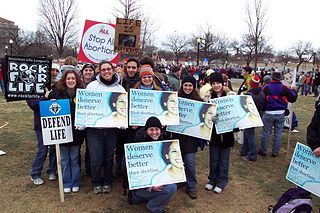
The United Nations Population FundUNFPA, formerly the United Nations Fund for Population Activities, is a UN agency aimed at improving reproductive and maternal health worldwide. Its work includes developing national healthcare strategies and protocols, increasing access to birth control, and leading campaigns against child marriage, gender-based violence, obstetric fistula, and female genital mutilation.
Roe v. Wade, 410 U.S. 113 (1973), was a landmark decision of the U.S. Supreme Court in which the Court ruled that the Constitution of the United States protects a pregnant woman's liberty to choose to have an abortion without excessive government restriction. The decision struck down many U.S. federal and state abortion laws. Roe fueled an ongoing abortion debate in the United States about whether or to what extent abortion should be legal, who should decide the legality of abortion, and what the role of moral and religious views in the political sphere should be. It also shaped debate concerning which methods the Supreme Court should use in constitutional adjudication.

George W. Bush's tenure as the 43rd president of the United States began with his first inauguration on January 20, 2001, and ended on January 20, 2009. Bush, a Republican from Texas, took office following a narrow victory over Democratic incumbent vice president Al Gore in the 2000 presidential election. Four years later, in the 2004 presidential election, he defeated Democrat nominee John Kerry to win re-election. Bush was succeeded by Democrat Barack Obama, who won the 2008 presidential election. Bush, the 43rd president, is the eldest son of the 41st president, George H. W. Bush.
Abortion is legal throughout the United States and its territories, although restrictions and accessibility vary from state to state. Abortion is a controversial and divisive issue in the society, culture and politics of the U.S., and various anti-abortion laws have been in force in each state since at least 1900. Since 1976, the Republican Party has generally sought to restrict abortion access or criminalize abortion, whereas the Democratic Party has generally defended access to abortion and has made contraception easier to obtain.
The Mexico City policy, sometimes referred to by its critics as the global gag rule, is a United States government policy that blocked U.S. federal funding for non-governmental organizations (NGOs) that provided abortion counseling or referrals, advocated to decriminalize abortion, or expanded abortion services. When in effect, the Mexico City policy is a U.S. government policy that requires foreign non-governmental organizations to certify that they will not "perform or actively promote abortion as a method of family planning" with non-U.S. funds as a condition for receiving U.S. global family planning assistance and, as of January 23, 2017, any other U.S. global health assistance, including U.S. global HIV and maternal and child health (MCH) assistance.

Abortion laws vary widely among countries and territories, and have changed over time. Such laws range from abortion being freely available on request, to regulation or restrictions of various kinds, to outright prohibition in all circumstances. Many countries and territories that allow abortion have gestational limits for the procedure depending on the reason; with the majority being up to 12 weeks for abortion on request, up to 24 weeks for rape, incest, or socioeconomic reasons, and more for fetal impairment or risk to the woman's health or life. As of 2022, countries that legally allow abortion on request or for socioeconomic reasons comprise about 60% of the world's population.
Reproductive rights are legal rights and freedoms relating to reproduction and reproductive health that vary amongst countries around the world. The World Health Organization defines reproductive rights as follows:
Reproductive rights rest on the recognition of the basic right of all couples and individuals to decide freely and responsibly the number, spacing and timing of their children and to have the information and means to do so, and the right to attain the highest standard of sexual and reproductive health. They also include the right of all to make decisions concerning reproduction free of discrimination, coercion and violence.
The Guttmacher Institute is a pro-choice research organization started in 1968 that works to study, educate, and advance sexual and reproductive health and rights. The organization works mainly in the United States but also focuses on developing countries. The Guttmacher Institute uses studies to help support policy making and program reform. The Institute is named after obstetrician-gynocologist and former president of Planned Parenthood Alan F. Guttmacher. The Guttmacher Institute has many sources of funding nationally and internationally. One of the Institute's biggest projects is keeping a running list of the reproductive health laws and policies throughout the United States.
Rust v. Sullivan, 500 U.S. 173 (1991), was a case in the United States Supreme Court that upheld Department of Health and Human Services regulations prohibiting employees in federally funded family-planning facilities from counseling a patient on abortion. The department had removed all family planning programs that involving abortions. The first amendment to the United States constitution was violated due to the implementation of this new policy. Physicians and clinics challenged this decision within the Supreme Court, where a 5–4 verdict allowed the regulation to go into effect, holding that the regulation was a reasonable interpretation of the Public Health Service Act, and that the First Amendment is not violated when the government merely chooses to "fund one activity to the exclusion of another."
A crisis pregnancy center (CPC), sometimes called a pregnancy resource center (PRC), is a type of nonprofit organization established to persuade pregnant women against having an abortion. CPCs generally provide peer counseling related to pregnancy, childbirth, and not having an abortion, and may also offer additional non-medical services such as financial assistance, child-rearing resources, and adoption referrals. CPCs that qualify as medical clinics may also provide pregnancy testing, sonograms, and other services. However, CPCs have also frequently been found to disseminate false medical information, usually about the supposed physical and mental health risks of abortion, but sometimes also about the effectiveness of condoms and the prevention of sexually transmitted infections.

The United States anti-abortion movement contains elements opposing induced abortion on both moral and religious grounds and supports its legal prohibition or restriction. Advocates generally argue that human life begins at conception and that the human zygote, embryo or fetus is a person and therefore has a right to life. The anti-abortion movement includes a variety of organizations, with no single centralized decision-making body. There are diverse arguments and rationales for the anti-abortion stance. Some anti-abortion activists allow for some permissible abortions, including therapeutic abortions, in exceptional circumstances such as incest, rape, severe fetal defects or when the woman's health is at risk.
In U.S. politics, the Hyde Amendment is a legislative provision barring the use of federal funds to pay for abortion, except to save the life of the woman, or if the pregnancy arises from incest or rape. Before the Hyde Amendment took effect in 1980, an estimated 300,000 abortions were performed annually using federal funds.
This is a timeline of reproductive rights legislation, a chronological list of laws and legal decisions affecting human reproductive rights. Reproductive rights are a sub-set of human rights pertaining to issues of reproduction and reproductive health. These rights may include some or all of the following: the right to legal or safe abortion, the right to birth control, the right to access quality reproductive healthcare, and the right to education and access in order to make reproductive choices free from coercion, discrimination, and violence. Reproductive rights may also include the right to receive education about contraception and sexually transmitted infections, and freedom from coerced sterilization, abortion, and contraception, and protection from gender-based practices such as female genital mutilation (FGM) and male genital mutilation (MGM).

Reproductive justice is "the human right to maintain personal bodily autonomy, have children, not have children, and parent the children we have in safe and sustainable communities," according to SisterSong Women of Color Reproductive Justice Collective, the first organization founded to build a reproductive justice movement. In 1997, 16 women-of-color-led organizations representing four communities of color – Native American, Latin American, African American, and Asian American – launched the nonprofit SisterSong to build a national reproductive justice movement. Additional organizations began to form or reorganize themselves as reproductive justice organizations starting in the early 2000s.

The Center for Reproductive Rights(CRR) is a global legal advocacy organization that seeks to advance reproductive rights, such as abortion. The organization's stated mission is to "use the law to advance reproductive freedom as a fundamental human right that all governments are legally obligated to protect, respect, and fulfill." Founded by Janet Benshoof in 1992, its original name was the Center for Reproductive Law and Policy.
Abortion in Uganda is illegal unless performed by a licensed medical doctor in a situation where the woman's life is deemed to be at risk.
The platform of the Republican Party of the United States is generally based on American conservatism, contrasting with the modern liberalism of the Democratic Party. The positions of the Republican Party have evolved over time. Currently, the party's fiscal conservatism includes support for lower taxes, free market capitalism, deregulation of corporations, and restrictions on labor unions. The party's social conservatism includes support for gun rights and other traditional values, often with a Christian foundation, including restrictions on abortion. In foreign policy, Republicans usually favor increased military spending and unilateral action. Other Republican positions include restrictions on immigration, more specifically opposition to illegal immigration, opposition to drug legalization, and support for school choice.
Abortion in Nebraska is legal up to the 20th week of pregnancy, except in the village of Hayes Center, Nebraska, and in the city of Blue Hill, Nebraska, where abortion has been outlawed by local ordinance. 50% of adults said in a poll by the Pew Research Center that abortion should be legal in all or most cases.
Abortion in Utah is legal; However, only 47% of Utah adults said in a Pew Research Center poll that abortion should be legal in all or most cases.
Abortion in Wisconsin is legal up to the 22nd week of pregnancy. 53% of adults said in a poll by the Pew Research Center that abortion should be legal in all or most cases. However, the Center for Reproductive Rights in its What if Roe Fell website labels the state as hostile towards abortion rights e.g., 20-week ban, telemedicine ban, TRAP requirements, admitting privileges requirement, transfer agreement requirement, reporting requirement, parental consent required, mandatory counseling, mandatory ultrasound and waiting period requirements.






